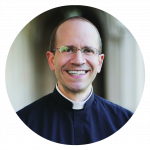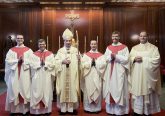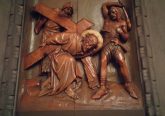How are Bishops Chosen?
Do bishops choose their successors? What is the process for selecting bishops?
The choosing of bishops entails a discernment of potential candidates’ human and spiritual qualities. It begins at the local level with consultation among priests and the faithful, then continues in Rome, where the pope and his delegates approve the selection. Some aspects of the process are public while others are confidential.
REQUIREMENTS
The New Testament mentions the choosing of bishops and their necessary qualifications in the First Letter to Timothy: “Whoever aspires to the office of bishop desires a noble task.” It enumerates a bishop’s characteristics, including being temperate, hospitable, able to teach, gentle, not a lover of money, not a recent convert, and of good reputation (see 1 Tim. 3:1-7).
According to the Church’s law, a bishop must be “outstanding in solid faith, good morals, piety, zeal for souls, wisdom, prudence and human virtues.” In addition, he should be of good reputation, at least 35 years old, ordained a priest at least five years earlier and in possession of a doctorate or licentiate in theology (Canon 378 §1).
INQUIRY STAGE
Possible candidates are surfaced every three years; the last time this was done locally was in 2020. In consultation with the bishops of his province, an archbishop then recommends suitable candidates to the Holy See through the apostolic nuncio’s office in Washington, D.C.
When there is a need for a new bishop and the possible candidates are surfaced, the nuncio’s office begins the investigative process. Bishops, including the incumbent bishop (in the case of a bishop’s impending retirement), the previous bishops (if any) of a diocese, and the other bishops of the province, weigh in on the candidates.
An inquiry among the priests and faithful then begins the process of selecting bishops. A questionnaire is sent to individuals, both priests and laity, who know the candidate well. This stage is carried out under the pontifical seal, meaning that those answering questionnaires may not discuss them with anyone. Questionnaires seek information about the candidate’s health, intellectual aptitude, prayer life and pastoral zeal.
DECISION OF THE HOLY SEE
Though much of the investigation is conducted locally, “the definitive judgment concerning the suitability of the one to be promoted pertains to the Apostolic See” (Canon 378
§2). Once the investigation concludes, the information is compiled and sent to the Vatican’s Congregation for Bishops. For each appointment three candidates are considered (called the “terna”), with the nuncio’s preference noted because it is important, but it is not determinative.
A member of the Congregation for Bishops summarizes the documentation, then the Congregation members discuss the appointment. They may decide to vote on the nuncio’s preferred candidate, select another candidate on the terna, or request that another slate of candidates be prepared.
Once a formal vote is held, the prefect of the Congregation for Bishops meets with the pope to present the recommendation. The Holy Father informs the Congregation of his decision, then the Congregation notifies the nuncio, who contacts the candidate. If the candidate accepts the appointment, a date for the announcement is determined.
Choosing bishops is an important task that acknowledges the different types of leadership Christ has given to the Church. As St. Paul wrote to the Ephesians, whether one is called to be an apostle, prophet, pastor or teacher, these roles “equip the holy ones for the work of ministry, for building up the body of Christ” (Eph. 4: 11-12).
 Father David Endres is associate professor of Church history and historical theology at Mount St. Mary’s Seminary & School of Theology.
Father David Endres is associate professor of Church history and historical theology at Mount St. Mary’s Seminary & School of Theology.
This article appeared in the June 2022 edition of The Catholic Telegraph Magazine. For your complimentary subscription, click here.













